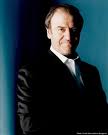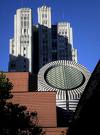 I asked the the superb, young Macedonian pianist Simon Trpceski jotted down some thoughts for lies like truth about his world. Mr. Trpceski kindly indulged me with the following…
I asked the the superb, young Macedonian pianist Simon Trpceski jotted down some thoughts for lies like truth about his world. Mr. Trpceski kindly indulged me with the following…
Whenever I am asked to describe the Republic of Macedonia in a few words, I say that it is:
The land of Alexander the Great
A country with an incredibly picturesque landscape
A land of both deep religion and vibrant culture
Full of tasteful wine and irresistible food…and beautiful women!
What more can one ask for? 🙂
I grew up in Macedonia during the years after the former Yugoslavia was crushed. I come from a very modest family, and grew up during a great transition period for the country. The economy was weakened due to all the turmoil, and it was very hard to get visas for travel, which made performing outside the country a great challenge.
Considering all of these obstacles, I find it miraculous that I was able to get onto the classical music circuit. But of course, I owe that to several strong influences in my life. I was very lucky to have studied piano at the University of St. Cyril and St. Methodius in Skopje with Boris Romanov. The Russian influence he brought to the music school there has had a great impact on how I developed as a player. And the spiritual and psychological support from my family and close friends is still a priceless gift. I know I could not have begun such an exciting musical career without the combination of these support systems.
I am proud to come from such a small, but historically important, country. Macedonia is home to a very lovely nation of people and traditions. Although Macedonians have struggled throughout the country’s history, a high spirit and sense of humor has always survived, which I think contributes to the great creativity in the arts that I see here.
So, whenever you have a chance to come to Macedonia, expect to be immediately welcomed with warm smiles. You will have a chance to walk on roads made of antique stones, visit numerous churches, monasteries and historical theaters, have a glass of fruitful and delicious wine and enjoy irresistible food. (Including my mom’s homemade pie…you can choose either cheese or leek!)
Speaking of which, I should mention that Macedonians love to eat! As a child I use to stuff myself with the fresh tomatoes, cucumbers, apples, peaches, apricots, plums, watermelons and melons from the villages where my parents came from. Of course, I still do that when I am at home! Apart from the great variety of cooked meat, you should also try a special trout from Ohrid Lake, a touristic pearl and the place where the first Slavic university was founded.
Growing up, my family was always singing and dancing – that is a strong part of the social culture at home. The old Macedonian folk songs, which date back many centuries, are full of soul and heart, and growing up with those melodies helped me in expressing the emotions found in classical music. The uneven rhythms of the folk music, and its dancing character, also helped me develop a sense of rhythm that can be applied to classical music as well!
The great heritage of folk music can have an impact on classical music in many ways. I have been working to incorporate the Macedonian folk traditions into playing for several years, and I am planning to continue this on a larger scale in the future because there are several Macedonian composers of different generations, well-educated both at home and abroad, who can combine the folk melodies with classical music in a very sophisticated way. It’s exciting to see these composers using the traditional folk melodies of Macedonia in contemporary classical music, because it can touch many different people. My experience so far says that both the critics and audiences love hearing this combination!
In the end, I hope that through music, I can express my love and pride for Macedonia to others, and show how one small–but in many ways big– country can be a wonderful new place for audiences to discover.
Simon TrpÄeski performs Grieg’s Piano Concerto in A minor with the San Francisco Symphony and conductor Vasily Petrenko April 1-3, 2010. Future performances include those with the Los Angeles Philharmonic and the symphonies of Houston, Milwaukee, Montreal and Atlanta, among others.

 I have a friend who’s nuts about shape note singing. For anyone unfamiliar with this powerful yet not widely known and often misunderstood form of music, you can find out all about it
I have a friend who’s nuts about shape note singing. For anyone unfamiliar with this powerful yet not widely known and often misunderstood form of music, you can find out all about it  I finally got around to viewing the performance of Eric Whitacre’s “Lux Aurumque,” a work which the composer created for his Virtual Choir, a sort of hybrid between a live performance by a choir standing together in one room and one involving people singing from many different locales via Internet hookup.
I finally got around to viewing the performance of Eric Whitacre’s “Lux Aurumque,” a work which the composer created for his Virtual Choir, a sort of hybrid between a live performance by a choir standing together in one room and one involving people singing from many different locales via Internet hookup. Last week, while preparing to write my weekly column for the
Last week, while preparing to write my weekly column for the  Everyone knows the Russians can teach the U.S. a thing or two about playing the music of Rachmaninoff, Borodin, Mussorgsky, Shostakovitch and co. That’s why audiences in this country flock in droves to hear groups like the Mariinsky Orchestra led by Valery Gergiev (pictured). At
Everyone knows the Russians can teach the U.S. a thing or two about playing the music of Rachmaninoff, Borodin, Mussorgsky, Shostakovitch and co. That’s why audiences in this country flock in droves to hear groups like the Mariinsky Orchestra led by Valery Gergiev (pictured). At  One of the many challenges facing performing arts presenters is figuring out seating plans. With audiences for some artforms such as dance typically booking up to see performances very late — sometimes on the day of performance — trying to work out how much to charge for tickets and how best to fill up premium seats is no easy matter for producers. Mathematicians could spend years working out algorithms to help arts organizations predict how to manage their houses and still the problem wouldn’t be solved.
One of the many challenges facing performing arts presenters is figuring out seating plans. With audiences for some artforms such as dance typically booking up to see performances very late — sometimes on the day of performance — trying to work out how much to charge for tickets and how best to fill up premium seats is no easy matter for producers. Mathematicians could spend years working out algorithms to help arts organizations predict how to manage their houses and still the problem wouldn’t be solved. I dropped in on the
I dropped in on the 
 Every so often I go to the theatre and get tricked into thinking the play I’m seeing is good. Beautiful performances, slick staging and strong visual imagery can sometimes make me believe that a drama is really profound when it isn’t. It’s only after the fact — sometimes several days or even weeks after the curtain has come down — that I realize that I had been duped.
Every so often I go to the theatre and get tricked into thinking the play I’m seeing is good. Beautiful performances, slick staging and strong visual imagery can sometimes make me believe that a drama is really profound when it isn’t. It’s only after the fact — sometimes several days or even weeks after the curtain has come down — that I realize that I had been duped.
 As I do not currently work for
As I do not currently work for  One of the problems with Tim Burton’s new Alice in Wonderland film is its title. Critics have been deriding the film for all kinds of reasons such as its shock tactics and the lack of charisma of its leading lady. And yes, much of the criticism is deserved, for the film isn’t up to Burton’s usual snuff.
One of the problems with Tim Burton’s new Alice in Wonderland film is its title. Critics have been deriding the film for all kinds of reasons such as its shock tactics and the lack of charisma of its leading lady. And yes, much of the criticism is deserved, for the film isn’t up to Burton’s usual snuff.